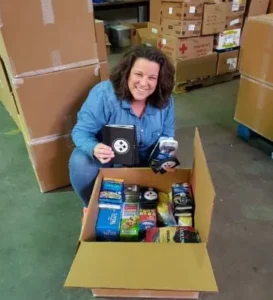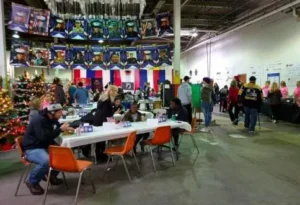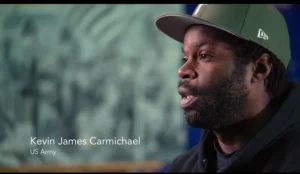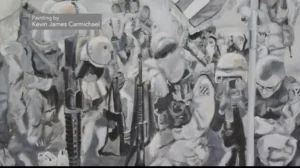Operation Troop Appreciation is a local, volunteer organization built to fill the gaps of providing services and material support to U.S. Military
by Anastasia Williams
When Kevin was 17 years old, he told his mom, “I’m not going to war.” He told her to convince her to sign the papers — papers which would make him a member of the United States Army. Kevin says she begged him not to go, but he wasn’t worried — he was excited. Kevin said he wasn’t always the most motivated high school student and he felt college wasn’t an option.
Kevin wanted to do something worthwhile and the Army recruiter who visited his high school in Virginia got his attention by talking about the potential economic opportunities that could come from joining. Kevin imagined himself driving down the road in a red Toyota sports car. He wasn’t thinking about any of the other expenses that would come out of his salary. Next thing he knew, he was hugging his mom, begging her to sign the papers. His mother pushed away her worry and signed.
Kevin was stationed all over the country: Washington, California, Louisiana. He had nearly finished his two-year enlistment and was counting down the days until he could go home. He hadn’t gone to war and he said one of the worst things he faced was not being able to shower for 13 days while stationed in the heat of the Louisiana swamps.
After the attacks on September 11, 2001, and with just three months left in his enlistment, Kevin was sent to Iraq. He felt the danger and knew that life was tenuous with guns pointed at him in the middle of the desert. Kevin’s three more months turned into eight more. He spent 239 days in combat.
Kevin’s promise to his mother had been broken. When Kevin returned to the US after his tour, he struggled mightily to re-adjust to civilian life.

Sherry Einhaus, a long-time Bethel Park resident, is an insurance agent, a part-time caregiver, and now the Chief Operating Officer of Operation Troop Appreciation (OTA) . For eight years, she was a Hillcrest Christian Academy volunteer mom, but when her son graduated and headed to high school, it was time for her to move on, too.
“I had this military thing in my head that just kept telling me military,” Einhaus said.
She called numerous organizations then wondered why six organizations hadn’t called her back. Couldn’t they use her help? She was driving home one day in 2016 and she heard an ad on the radio for an organization named OTA. She wanted to know more.
OTA is a multi-faceted, nonprofit organization, based in West Mifflin, PA. The organization focuses on serving both veterans in Western Pennsylvania and active-duty military personnel. One of the programs for active-duty service members is filling requests from soldiers. Troops send a wish list and OTA volunteers make packages with the items and ship them off to the troops. These packages can include any number of items, from equipment to candy. The boxes often include items one might assume the military provides to soldiers — things like pillows, socks, clothing, summer gear, protein powder and beef jerky.
All enlisted troops receive a salary which depends on their rank and years of service, ranging from $25,790.40 to $112,827.60 a year. Soldiers also receive allowances to help pay for housing, food, equipment, and other needs. Still, the allowances do not always cover everything, which means that soldiers (usually those at a lower rank, often on the front lines, in harm’s way), sometimes struggle to cover basic expenses that need to be paid out of pocket.
OTA is there to fill the gaps and provide soldiers with tailor-fit resources, rather than one-size-fits-all. It’s all custom and unique. But the items that OTA sends do not just bring comfort and pleasure. Some are necessary for survival.
A military unit stationed in the endless desert was desperate because they were unable to determine their precise location. OTA responded and sent GPS watches, which allowed them to better navigate the vast terrain.
Over the past 18 years, OTA has served over 200,000 troops and veterans between the Active-Duty Program and Welcome Home Program. One of the reasons OTA is able to reach numerous troops and veterans is by working with other organizations, one of them being PAServes . PAServes is a program based in Pittsburgh as part of AmericaServes, a larger organization aimed at helping veterans. PAServes acts as a middleman to OTA, helping them locate and contact those in need.
Einhaus loves the fact that OTA is completely volunteer — absolutely no salaries are included in OTA’s budget. She began as a regular volunteer, boxing care packages, and helping out at events. Over time, she took on more responsibility, eventually becoming OTA’s COO and Program Manager, planning and managing events such as the Bike Run and the Christmas Party.
“If we were to take a paycheck then that much less money goes out to the military and that is unacceptable,” Einhaus said.
*****
Sherry believes she was meant to meet a man who was a sniper in the Army. She was ambivalent, but created an online dating profile; maybe she was just wanting to be more social after COVID quarantines. She clicked on one profile of a man on a motorcycle, from southwestern PA, and they started making small talk. Sherry told him that she worked for a military organization.
“Oh,” he said dismissively.
“What does that mean?” Sherry asked.
He told her about his chronic nightmares–they were something that he had to learn to live with after working as a sniper in an active combat zone in the Middle East. He told her about his 20-year battle to obtain services he deserved from the VA.
He told her, “Nobody helps veterans.”
Most importantly, he needed his VA benefits and Sherry could provide a bridge for him to navigate that. She connected him with a friend who was a former U.S. Navy veteran; her friend had his own struggles with the VA and now helps other veterans complete the requisite and often confusing forms needed to get the benefits they deserve. It’s his therapy, it’s his way of not thinking about his own nightmares. With their help, the former sniper was able to access more VA benefits in one year than he had received in the 20 years previous.
According to the US Department of Veterans Affairs, post-traumatic stress disorder (PTSD) is more common in veterans than civilians and about around seven-percent of veterans develop PTSD at some point. Working under stressful, dangerous conditions, maintaining vigilance takes a toll. Some suffered severe injuries; some witnessed things that are hard to imagine. People with PTSD experience constant arousal, they experience flashbacks ; many self-isolate in an effort to avoid triggers. Some turn to drugs and alcohol — they are 14 times more likely to be diagnosed with substance use disorders (also according to the Department of Veterans Affairs).
The agencies that are there to help, sometimes, just don’t. The Department of Veterans Affairs (VA) is part of the United States government responsible for providing benefits to U.S. veterans and their families. Some benefits include health care, life insurance, and disability benefits. VA employees at the Veterans Health Administration serve over 9 million veterans .
However, securing those benefits can be like navigating a haunted house maze. A former Army sniper said, “You don’t see nothing [from the VA] for six months and then when you do see something, [the VA] ask[s] you a question that they screwed up anyway.”
His frustration is not uncommon.
OTA helped him with smaller things, too.
“[OTA] got me items for my house. They got me a bed mattress … they helped me immensely when I wasn’t able to get it myself,” he said.
Sherry says the goal is to make each vet, “feel like a human being.”

Kevin, the U.S. army sergeant who had spent nearly eight months fighting in Iraq, was still a young man when he returned from active duty. He also says that there are gaps in coverage — gaps in who gets help and who doesn’t. He felt like he had fallen through the cracks, himself. He was battling PTSD. He became homeless. But he did land a job in western Pennsylvania and through that job he met Einhaus.
An important facet of OTA is their Welcome Home Program, designed to help veterans who are home.
OTA provides taxi rides to veterans for medical appointments, which removes a financial burden and also allows veterans who suffer from PTSD to avoid stressful situations like riding on a crowded bus full of strangers and loud noises. They also provide a Welcome Home Kit which contains necessities like a bed, toiletries, food, water, and cooking supplies.
Kevin was in almost constant pain, a consequence of sleeping on the floor of his tiny apartment night after night, but he never asked for help.
He came home one day to find a bed, plus toilet paper, food, and other items OTA provided. It was Einhaus who made sure he had everything, all the way down to the shower curtain rings.
“You need anything, you call me,” he remembered she told him, before wrapping him a hug.
OTA’s mission is to fill these tangible gaps for soldiers and veterans, but in doing the work, lasting relationships are formed. Einhaus isn’t superhuman. She gets tired. She needs rest. But she’s always motivated by the next letter, the next email, the next phone call. A call for help inspires her to keep up the work.
Kevin is good now. He has a home, a job, a college degree, and a love and talent for painting. Einhaus still calls.
A part of Kevin hates these calls. He doesn’t like to ask other people to do things for him. But he also loves these calls because he knows that with each call, he has a real friend in Sherry.
Kevin says calls from Einhaus go like this recent one: “Hey, you good, Kev? Do you need anything? I got a case of water here that I can drop off at 6:00 tonight.”
“Just a case of water,” he told her.
“You sure? I got hoagies here too,” Sherry responded.
“Well, okay.” It’s hard for Kevin to say no to Einhaus.
“Operation Troop Appreciation: they help vets and that’s a fact and I will die with my flag on that,” Kevin said.


Lead photo of Kevin at an OTA outing at PNC Park courtesy of Anastasia Williams
Anastasia Williams is a sophomore at the University of Pittsburgh
Author’s Note:
This piece is part of a larger piece that I wrote for a creative nonfiction class at the University of Pittsburgh. I focused on the fact that Sherry and OTA help veterans in western PA. However, Sherry’s community reach is far greater as she helps educate people on some of the issues facing veterans and active-military personnel. One of the ways she does this is by working with high school students to fulfill volunteer hours needed for National Honors Society.
After speaking with Sherry, I knew that she was going to be the focal point of my essay because the effort and time that she puts in is too special to not share. I had no clue that she would spend so much time meeting with me and connecting me with veterans to interview for this piece. She educated me on how to speak with veterans, and the importance of protecting their privacy. Many of the veterans I interviewed shared with me their deeply personal experiences. For this reason, their last names have not been included throughout this piece.
The post The Power of Care: Operation Troop Appreciation first appeared on Pittsburgh Institute for Nonprofit Journalism .


